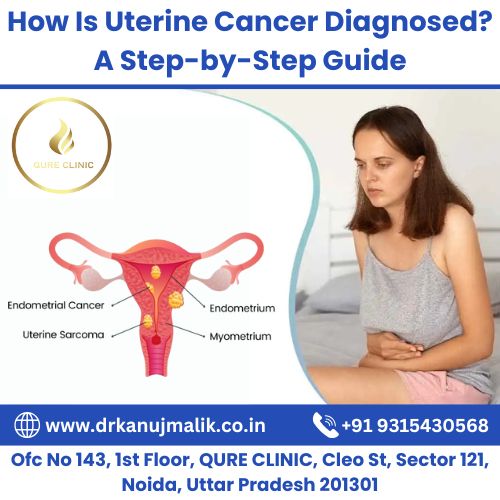Uterine cancer, commonly known as endometrial cancer, is one of the most frequently diagnosed cancers in women, especially those over 50. Early detection is crucial for effective treatment, as uterine cancer has a high survival rate when identified in its early stages.
At Dr. Kanuj Malik’s clinic, we emphasize the importance of thorough diagnostic processes to ensure that women receive the best care possible.
In this blog, we will walk you through the steps involved in diagnosing uterine cancer, along with insights from Dr. Kanuj Malik, a highly experienced uterus cancer specialist in Noida with over 14 years of expertise in surgical oncology.

Step 1: Recognizing the Symptoms of Uterine Cancer
Uterine cancer often presents with symptoms that should not be ignored. The most common sign is abnormal vaginal bleeding, particularly in postmenopausal women. Other potential symptoms include:
- Pelvic pain or discomfort
- Unexplained weight loss
- Pain during intercourse
- A frequent need to urinate or difficulty urinating
If you experience any of these symptoms, it is crucial to consult a doctor promptly. Dr. Kanuj Malik always advises women to seek medical attention if these signs appear, as early detection can lead to better outcomes.
Step 2: Medical History and Physical Examination
When you visit our clinic, the first step is a comprehensive medical history. Dr. Malik will ask about your menstrual history, any family history of uterine cancer, and other relevant health details. A physical examination, including a pelvic exam, is performed to check for any irregularities, such as unusual growths or swelling in the pelvic region.
Although a physical exam cannot definitively diagnose uterine cancer, it plays a vital role in identifying signs that necessitate further tests.
Step 3: Transvaginal Ultrasound
One of the first and most common tests used to diagnose uterine cancer is a transvaginal ultrasound. This procedure involves inserting a small probe into the vagina, which uses sound waves to create detailed images of the uterus. The ultrasound can reveal abnormal thickening of the uterine lining, which is a potential indicator of cancer.
At our clinic, Dr. Kanuj Malik often recommends this non-invasive test as an initial step. It helps provide clear insights into the condition of the uterine lining and can also assist in ruling out other conditions that may cause similar symptoms.
Step 4: Endometrial Biopsy
If the ultrasound results suggest an abnormality, the next step is often an endometrial biopsy. During this procedure, a small sample of tissue is taken from the uterine lining (endometrium) for laboratory analysis. This biopsy is crucial for confirming whether cancerous cells are present.
Dr. Kanuj Malik highlights that an endometrial biopsy is one of the most reliable methods for diagnosing uterine cancer. It provides the necessary tissue sample to assess whether the cells are cancerous, and it can also help determine the cancer’s grade.
Step 5: Dilation and Curettage (D&C)
If the biopsy results are inconclusive or if additional tissue is needed, Dr. Malik may recommend a Dilation and Curettage (D&C) procedure. This involves dilating the cervix and scraping tissue from the uterine lining for further examination.
D&C is often used when an initial biopsy fails to provide a definitive result or when more detailed tissue analysis is required. This procedure is generally done under anesthesia, and recovery is typically quick.
Step 6: Imaging Tests for Cancer Staging
Once uterine cancer is diagnosed, imaging tests are performed to determine its stage—how far the cancer has spread. These tests may include:
- CT Scan (Computed Tomography): Helps identify the extent of the cancer’s spread to the pelvic region, abdomen, or other organs.
- MRI (Magnetic Resonance Imaging): Provides high-resolution images of the uterus and surrounding tissues to assess the cancer’s growth and spread.
- PET Scan (Positron Emission Tomography): Often used to detect metastasis (spread of cancer) to distant organs like the lungs or liver.
These imaging tests are essential in forming an accurate picture of the cancer’s stage, allowing Dr. Malik and his team to tailor the most appropriate treatment plan for the patient.
Step 7: Laparoscopy or Laparotomy
In some cases, further surgery may be necessary to assess the extent of cancer spread. This may include laparoscopy (a minimally invasive procedure using small incisions) or laparotomy (a more invasive approach requiring a larger incision). These procedures allow for a direct view of the pelvic cavity and help in determining whether the cancer has spread to other organs.
Dr. Kanuj Malik, with his wealth of surgical expertise, ensures that patients are fully informed about these procedures and what to expect. These diagnostic tools are instrumental in assessing the cancer’s stage and formulating the most effective treatment strategy.
Conclusion
Early detection of uterine cancer is essential for a favourable prognosis, and Dr. Kanuj Malik is dedicated to providing accurate diagnoses and personalized care. With advanced diagnostic tools and techniques, he ensures that every patient receives the highest standard of care.
If you are experiencing symptoms or have a family history of uterine cancer, don’t hesitate to schedule a consultation at our clinic. As a leading uterus cancer specialist in Noida, Dr. Malik is here to guide you every step of the way.
Qure Clinic
Address – Shop No 143 1st floor, Cleo Street, near CLEO COUNTY, Sector 121, Noida, Uttar Pradesh, 201301
Email –kanujmalik03@rediff.com
Phone – +91 9315430568
Monday To Saturday – 9:00AM–9:00PM
Sunday closed
Google Map Location Listing – https://g.co/kgs/BfrTkmW
